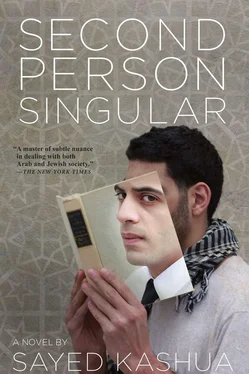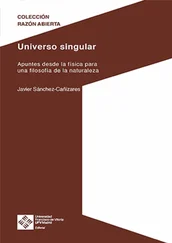“I’m not hungry, but I’ll have a little,” I said, and I tore off a modest piece of pita and dipped it into the deep bowl. I bowed my head and put it in my mouth, chewing carefully, with my mouth shut, trying not to make any eating noises. And I immediately took a napkin and mopped up around my mouth. When I eat, it always seems to me that the food is smeared all over my cheeks and across my whole face.
Skinny, curly-haired Leila with her small delicate face finished her hummus fast and asked, “So, are you going to eat all of yours?” and when I shook my head no, she pulled my bowl over and ate it, too, this time with a fork and no pita. When we were done we paid separately.
Our destination was the Aluwad neighborhood, the home of Shareef Abu-Siam, Leila’s addict.
“Where are the Abu-Siams?” I asked an old salesman who was sitting in a wicker chair in front of the neighborhood grocery store. He pointed at a green gate, behind which we could hear an entire clan of children. Ten children met us at the entrance and an elderly woman, whose hands were busy with her hair covering, shooed them off and asked, “Are you from social services? Welcome.” The small courtyard was trapped between rooms and walls, and cement stairs descended from the upper floor in all directions and seemingly without any logic. Some of the rooms on the upper floors were unpainted and unfinished and the windows and doors were wide open. “Coffee or tea?” the old woman asked.
“No, thank you,” Leila said. “Are you Shareef’s mother?”
“Yes,” the woman said, and immediately called out three names. “These are his kids,” she said as the children clustered around her. “Two boys and one girl, and the infant’s in his mother’s arms.” The woman pointed to one of the doors. “That’s Shareef’s house. He’s not home, just his wife’s around. God only knows where he is. He was once as strong as a convoy camel. Inshallah you will be able to help, my children,” she said.
A young woman opened the door to Shareef’s house. “Please,” she said, “come in. It’s cold outside. Son,” she added, “go bring chairs.” Her son ran downstairs and came back with white plastic stools from the courtyard and set them down in the small room, under the light of a single bare bulb. A kerosene heater burned in the middle of the room. Mattresses were stacked in the corner and, on a small pallet near the stove, the baby slept.
Shareef’s wife looked to be less than thirty. She was wearing loose green sweatpants and an old sweater, and she sat opposite Leila, answering her questions with tired eyes. Shareef leaves early each morning. It’s not clear where he goes. He says he’s going to work, but he never comes home with money. He comes home at all hours. And he only comes home when he’s high and has another hit for the morning. Sometimes he pulls out a spoon, a lemon wedge, and a lighter right in front of the kids and starts preparing his hit. He’ll tie off and stick the needle in right in front of the kids. The young woman held a napkin in her hand and dabbed at her eyes and nose as she spoke. Leila sat before her with a pen and paper and nodded her head. She asked more and more questions, mostly about the kids, with surprising proficiency, unrattled by the tears, speaking softly but without pity.
The children don’t go to school anymore, Shareef’s wife explained. They weren’t even enrolled this year. Why should I sign them up? Last year I did but they never went to class, just spent all their time roaming around the Old City. According to the neighbors, her eldest had been seen begging near Jaffa Gate, where the tourists congregated, and outside the mosque. Might as well stay at home, she said, it’s better than having them out on the street. The oldest one was arrested for trying to steal a tourist’s bag and that was before he even started third grade. The younger ones try to do what he does, they copy him. According to her friends, there are boarding schools for kids like hers and she used to think it was impossible for a mother to send her children away and not see them every day, but now she knows it’s the only thing that will save them. “As long as they’re put in a good place,” she said. “At least that way they’ll have a clean bed, food, and an education. Maybe they’ll even learn a trade or something. If they stay here they’ll end up just like their father, who’s never ever going to stop using.” Her husband’s older brothers had locked him up in his room several times, keeping him there for days on end, swearing they wouldn’t let him out till he kicked the habit, and he would yell, beg, and cry like a baby but they didn’t give in — till they got tired of the whole routine. Then they’d let him go and soon enough he’d disappear again, returning home a day or two later, high as a kite.
Shareef was the youngest of five brothers, his wife said. All of the brothers had left the neighborhood. They owned houses in Dahiyat al-Bareed or in a-Ram, and lived there with their families. Shareef was the only one who had stayed on in his mother’s house after he got married. Her mother-in-law, said Shareef’s wife, lived in one room and they had the run of the other three. But the new residency law brought all the brothers back to their mother’s house. None of them wanted to risk losing their national health insurance, their free educations, their blue identity cards. So they came back with their families and now all we have is one room, she told Leila, and then because they didn’t have enough space they built two extra rooms upstairs and now the city says it will demolish the rooms because they were built without a permit, so now we have a whole legal battle, a whole other mess. In the morning, she said, blowing her nose, I stack the mattresses, and in the evening I lay them back out. Everyone lives in this one room, just like this.
Leila walked back to the office with her head bowed. She said nothing. When we got there, she asked me to remind her of the clerk’s name at the welfare bureau and before leaving the room she asked me which boarding school was considered the best for at-risk kids.
CORDUROYS
I recall the smell of Yonatan’s clothes. Somehow they held on to the good smell of the fabric softener and not the medicinal scent of the attic.
I showed up at Scout Street an hour before the beginning of my shift and hesitantly asked Osnat if it would be okay to come a little late the following evening.
“What time will you be able to come?” she asked.
“I’m not sure, but no later than midnight. Is that okay?”
She smiled. “It’s only okay if it’s because of a girl.”
I blushed and let a stupid grin creep across my face.
“ Sakhtein ,” she said, turning to Yonatan and raising her voice, “at long last our shy friend has found someone. See!” then she turned back to me and asked for details.
“An intern at the office,” I said.
“How old?”
“Twenty-one.”
“Name?”
“Leila.”
“Pretty?”
I nodded.
“You’re so cute. Where are you going?”
“To a party. . at the Hyatt. .”
“And what are you going to wear?”
I shrugged. “I’m going like this,” I said, pointing to the clothes I had on.
Osnat shook her head. “No, you’re not. I hope you don’t take this the wrong way, but you’re not going like that. You’ll scare her away.”
I had never thought about clothes before. I had never bought anything for myself aside from underwear and socks, and those I had gotten at the flea market outside Damascus Gate. Every once in a while I’d come home and find that my mother had bought me a new pair of jeans or a shirt or some sweatpants. Before I left for college, she bought me a new wardrobe, clothes that were suitable for the cold Jerusalem winters.
Читать дальше












